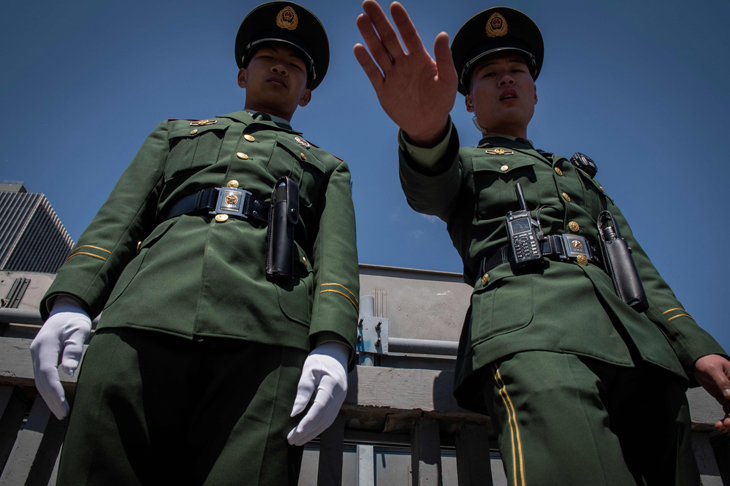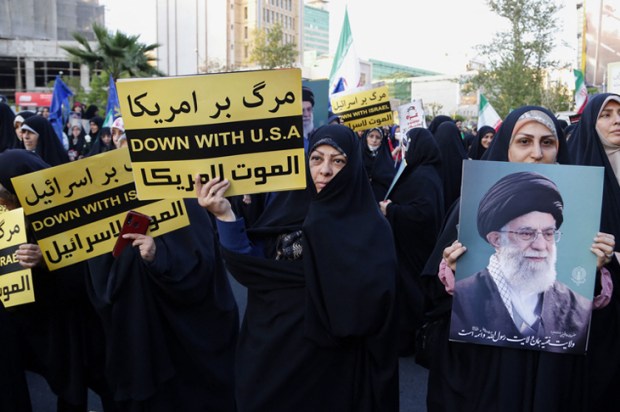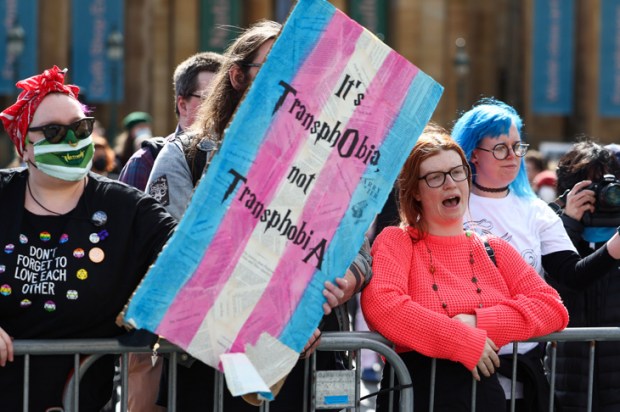Victorian Premier Daniel Andrews had nothing to say from his sick-bed when Prime Minister Morrison cancelled his Yellow Brick Belt and Road Initiative deal with China. Hu Xijin, the editor of the Global Times, China’s rabid media attack dog was not so quiet. ‘A formal agreement has been cancelled so easily. Australians, is your country an uncivilised rogue that deserves stern admonition and punishment?’ Hu was the wit who last year described Australia as ‘chewing gum stuck on the sole of China’s shoes’. This time he sounded more like a querulous nanny.
‘Why do Chinese diplomats and propagandists (is there a difference anymore?) talk to the rest of the world as if we were all naughty children?’, tweeted an exiled New Yorker wearily. Others mocked China in the regime’s own vernacular, describing the BRI as an ‘internal affair’ or just an ‘historical document’, the words used by the Foreign Ministry to describe the Sino-British Joint Declaration guaranteeing that Hong Kong’s way of life would be unchanged until 2047. An Indian tweeted, ‘Look who is talking! A rogue nation who exports viruses and wants to pursue its expansionist policy through its so-called One Belt One Road (to trap other countries in debt)’ adding that ‘Australia has given a tight slap to the Chinese government through its decision. India supports Australia’.
It is the first time a BRI deal has been torn up and popular support for Australia’s actions will fuel China fears that other countries will follow suit. Earlier in the day, China’s deputy ambassador blamed Australia for setting another precedent, saying, ‘Australia was the first to ban Huawei’ from building its domestic telecommunication infrastructure and then ‘even persuaded others to follow suit’, conniving with the US in a ‘very unethical, illegal, immoral suppression of Chinese companies’. Of course, no foreign telco has been allowed to build China’s telecommunication infrastructure but since Beijing has been allowed to flout international rules ever since it joined the World Trade Organisation (WTO) in 2001, it hardly notices its hypocrisy. And why is Huawei being banned? A report in the Netherlands, days earlier, revealed that in constructing networks, it had created ‘unlimited access’ to eavesdrop on phone calls, even of the Dutch PM.
The threat posed by China took a more lethal form on Saturday when President Xi Jinping attended a ceremony at the launch of three new naval vessels; a guided-missile destroyer, an amphibious assault ship and a ballistic missile nuclear submarine which would enable China to launch a ballistic missile attack on the west coast of the United States from the South China Sea.
After such a display of China’s growing strike force and blue water projection, on Sunday – Anzac Day – Defence Minister Peter Dutton was only stating the obvious, when he said a conflict involving China over Taiwan could not be discounted. This is not news. Last July, Australia’s Defence Strategic Update said that while conventional war was still ‘unlikely’ it was ‘less remote than in the past’.
Dutton is far from alone in this assessment. German Chancellor Angela Merkel said this month she was worried about the threat of military conflict in the South China Sea, echoing NATO Secretary General Jens Stoltenberg who said on 13 April, ‘China’s increasingly powerful actions are challenging the rules-based international order’ by ‘openly threatening Taiwan, coercing regional neighbours, and harming the freedom of navigation in the South China Sea’.
Taiwan’s Ministry of Foreign Affairs rightly put the emphasis on collective action, calling on all countries with similar values to jointly deter China. The most effective vehicle is the Quadrilateral Security Dialogue and joint military exercises initiated in 2007 by Japan’s Prime Minister Shinzo Abe with US Vice President Dick Cheney, Indian Prime Minister Manmohan Singh and Australian Prime Minister John Howard. Unfortunately, it was temporarily killed off by Labor PM Kevin Rudd to curry favour with Beijing. When the Coalition returned to government, however, Prime Minister Tony Abbott renewed Australia’s interest and in 2017, the original members revived it. It has proved a useful alliance in countering China militarily and diplomatically and attracted support from Canada and Europe, who are sending naval vessels to support freedom of navigation in the Taiwan Strait and the South China Sea.
When it comes to trade, collective action is also preferable. Australia, like Canada, the US, the UK, Japan, Korea, Taiwan, Sweden, Norway, Germany and many others, has been subjected to China’s bogus complaints as a pretext to impose punitive tariffs to coerce the government into kowtowing to Beijing. These practices violate the China/Australia Free Trade Agreement, the Regional Comprehensive Economic Partnership and the WTO Rules. Democratic countries should jointly bring a case to the WTO addressing China’s systemic violations and forcing it to either adhere to the Rules or withdraw. Acting in concert minimises the risk to individual countries and increases the chance of success.
Yet when Home Affairs secretary Michael Pezzullo said Australia could not ignore the increasing drum beat of war and should not sacrifice its liberty to avoid conflict, it was too much for Labor’s former opposition leader Bill Shorten who he said he didn’t understand why the government was using such ‘inflammatory language’. Western Australia’s Premier Mark McGowan urged federal government ‘to tone it down’, claiming that it was ‘totally unnecessary’ and ‘in no one’s interest’. Certainly, it would not be in the interests of anyone hoping to receive Aldi bags of cash from donors close to the Chinese Communist party, as the NSW Labor party did in 2019.
Those in Labor (and any other party) still seduced by the siren song of easy money from China should beware; a recent poll showed that nine out of ten voters believe Australia and its allies should defend an independent democratic state in our region if it was threatened or attacked by China, 85 per cent want the Port of Darwin, currently operated under a 99-year lease by the Chinese-owned Landbridge Group, to be returned to Australian management and the same percentage want increased defence spending because of the increased Chinese threat.
Even the ABC admitted in a report on China’s trade sanctions against Australia that ‘more is at stake than exports alone’. As one man whose business has been devastated by China’s trade war told the ABC, ‘Unfortunately, for our democracy, for our way of life, for everything that we hold dear about Australia, I think Australia needs to stand up for itself.’ The voters have worked out that the pot of gold at the end of the rainbow is a Chinese bribe and will punish at the polls those who sell out the country.
Got something to add? Join the discussion and comment below.
Get 10 issues for just $10
Subscribe to The Spectator Australia today for the next 10 magazine issues, plus full online access, for just $10.
You might disagree with half of it, but you’ll enjoy reading all of it. Try your first month for free, then just $2 a week for the remainder of your first year.














Comments
Don't miss out
Join the conversation with other Spectator Australia readers. Subscribe to leave a comment.
SUBSCRIBEAlready a subscriber? Log in